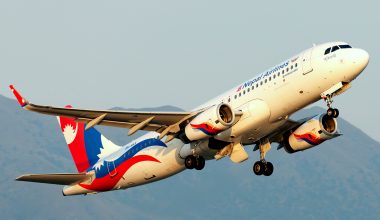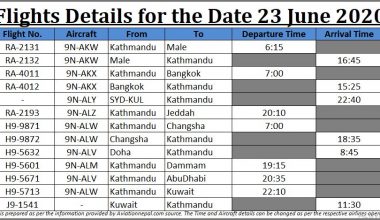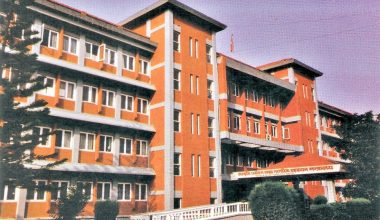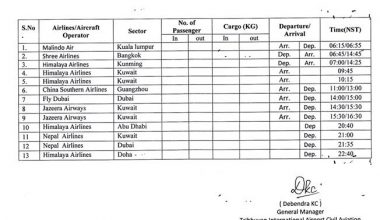Aeronautical Engineers file complaint Against CAAN
The Civil Aviation Authority of Nepal (CAAN) published a vacancy announcement for its various engineering positions on 2074/08/06. Among other usual positions, the vacancy requirement lists a position for Airworthiness Officer (Level 7), which has apparently gone through an unusual tempering with regards to the application criteria, related to Aeronautical Engineering concerns directly interlocked with aviation industry. Consequently the issue resulted protests and the aeronautical engineers working indifferent airlines also have already filed a complaint to CAAN, Ministry and Commission for the Investigation of Abuse of Authority (CIAA) stating that the objection on the criteria of applicants for published vacancy being unfair.
Unlike previous vacancies for the position, which required candidates with aeronautical engineering (or equivalent, but not ‘related’) degrees, the new criteria for application to the position allows candidates completing bachelors in science and mathematics with an aircraft maintenance license (no explicit requirement for experience mentioned), or bachelors in mechanical/electrical/electronic/airworthiness/aeronautical engineering with a minimum of 2 years experience in aircraft maintenance or continuing airworthiness.
According to one of the Aeronautical Engineer”Aeronautical engineers are not included in the list of eligible candidates in other professional engineering quotas. From the subtle placement of ‘aeronautical engineering’ at the very last among the qualifying degrees, to some foolishly minor issues such as the fact that there is not really a stand-alone ‘airworthiness engineer’ degree awarded by any university of any knowing, there are various layers of problems within this criteria. Some of it may be rooted in pragmatism, but largely, it reflects negligence.
When the vacancy was announced, aeronautical engineers working in the aviation industry in Nepal started noticed these problems, the uneasiness eventually gained traction, and their concern has now risen into a strong protest against the unfairness. A group of professional aeronautical engineers recently started an online petition against the vacancy and demanded a revision of the criteria. [https://www.change.org]
It was also known recently that the recruitment guidelines was in fact revised for airworthiness engineer and flight operations related positions, some time before the announcement of the vacancy. And the new guideline for recruitment of airworthiness engineers is appalling- to put it mildly.”
He also added the revised policy is extremely, and almost intentionally, unfair towards aeronautical engineers.
This becomes even more apparent in the following immensely irrational criteria included in the revised guideline:
Airworthiness officer- Level 10 and 11 [OPEN COMPETITION]
Criteria 1: Bachelors in science and mathematics + “Aircraft maintenance license” + Minimum 10 years experience (professional field not specified explicitly)
Criteria 2: Masters in mechanical/electrical/electronic/airworthiness/aeronautical engineering+ Minimum 10 years experience in aircraft maintenance or continuing airworthiness
Criteria 3: Bachelors in mechanical/electrical/electronic/airworthiness/aeronautical + Minimum 15 years experience in aircraft maintenance or continuing airworthiness
From a professional perspective, it is apparent that the guidelines were prepared without sparing any rigid thought or expertise towards the legitimate need of the position. Why should aeronautical engineers need a masters degree, along with the requirement for added experience, in a field that is closest to them, while someone with B.Sc. can apply with barely a license and equivalent years of experience (apparently) in any field of expertise? Does CAAN regard a position as responsible and critical to aviation safety as that of an airworthiness officer so generic that it does not value the academic background and expertise need to hold it? Where does this fit in its responsibility towards improving the standard of flight safety in the country?
It is reasonable in certain cases, for e.g. in the vacancy requirements at Nepal Airlines Corporation, that aeronautical and mechanical engineers, or aeronautical and electronic engineers, are allowed to apply for the same positions (A&C and Avionics, respectively), because the expertise required in these positions are quite diverse. However, the position of an airworthiness office is more specific and narrow in terms of the expertise and skills it should require.
For many aeronautical engineers, this new guideline has felt more painful than just an unfair policy-debacle. Aeronautical engineers have perhaps been the most struggling group of engineers in Nepal. Jobs are scarce, and the future and scope in the aviation field hasn’t been the most promising for everyone. In many cases, aeronautical engineers have also ironically been paid relatively low in the aviation industry itself- the sole industry that provides them employment in the country. On top of their entire struggle, this new vacancy holds a greater significance.
It represents a systematic disenfranchise of aeronautical engineers, and a negligence towards their importance, the role they play in Nepali aviation industry, and the professional sacrifices they make on a day to day basis.
However, this new unfortunate development has also given many of them an opportunity to organize and raise their voices against the systematic negligence and unfairness. A large number of aeronautical engineers recently came together, perhaps for the first time in the country, to protest against the new vacancy advertisement, and have already submitted letters to the concerned authorities and government bodies demanding for a revision of the new guideline.
They demand that the new vacancy advertisement be scrapped and the guidelines be revised to a more dignified status that not only respects the responsibilities of the position but also restores aeronautical engineering as its priority.











